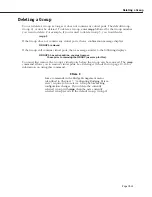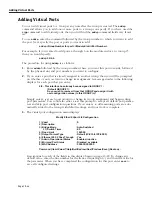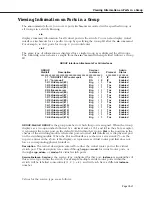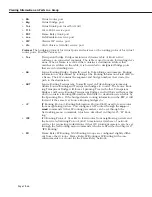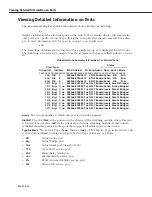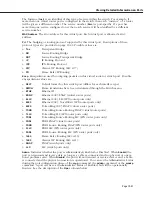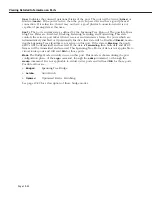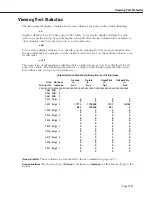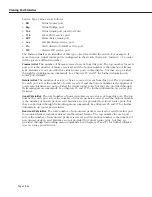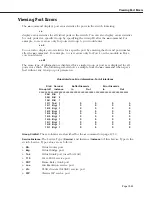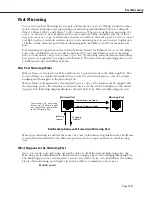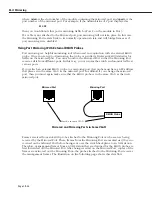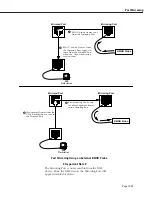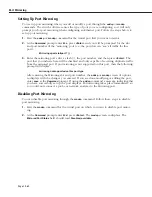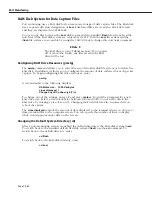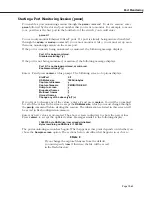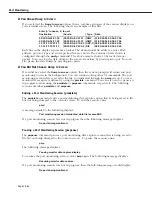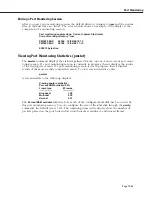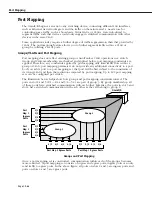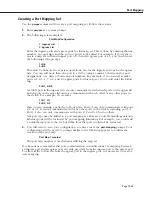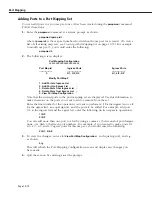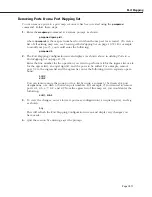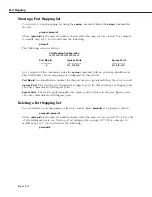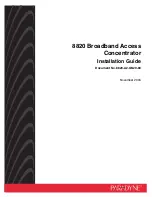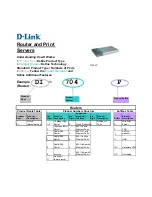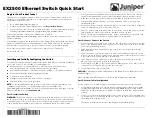
Port Mirroring
Page 19-57
Port Mirroring
You can set up Port Mirroring for any pair of Ethernet (10 or 10/100 Mbps) within the same
switch chassis. Ethernet ports supporting port mirroring include10BaseT (
RJ-45
), 10BaseFL
(fiber), 10Base2 (
BNC
), and 10Base5 (
AUI
) connectors. When you enable port mirroring, the
active, or “mirrored,” port transmits and receives network traffic normally, and the “mirror-
ing” port receives a copy of all transmit and receive traffic to the active port. You can connect
an
RMON
probe or network analysis device to the mirroring port to see an exact duplication
of traffic on the mirrored port without disrupting network traffic to and from the mirrored
port.
Port mirroring is supported on Omni Switch/Router chassis for Ethernet (10 or 10/100 Mbps)
ports only. An Ethernet port can only be mirrored by one other Ethernet port. A mirroring
port can only mirror one port at a time. Up to five (5) mirroring sessions (mirrored-mirroring
port pairs) are supported in a single switch chassis. The mirrored and mirroring ports can be
in different Groups and different
VLAN
s.
How Port Mirroring Works
When a frame is received on a Mirrored Port it is copied and sent to the Mirroring Port. The
received frame is actually transmitted twice across the switch backplane—once for normal
bridging and then again to the Mirroring Port.
When a frame is transmitted by the mirrored port, a copy of the frame is made, tagged with
the mirroring port as the destination, and sent back over the switch backplane to the mirror-
ing port. The following diagram illustrates the data flow for a Mirrored-Mirroring port pair.
Relationship Between Mirrored and Mirroring Port
When port mirroring is enabled, there may be some performance degradation since all frames
received and transmitted by the Mirrored port need to be copied and sent to the Mirroring
port.
What Happens to the Mirroring Port
Once you set up port mirroring and attach cables to the Mirrored and Mirroring ports, the
Mirroring port is administratively disabled and no longer a part of the Bridging Spanning Tree.
The Mirroring port does not transmit or receive any traffic on its own. In addition, the Admin
Status of the mirroring port displays in switch software commands, such as
vi
, as
M <slot> <port>
Mirrored Port
Mirroring Port
Incoming
Frames
Outgoing
Frames
Copied Incoming Frames
Copied Outgoing Frames
Incoming and outgoing
frames on the Mirrored port
are copied and transmitted
to the Mirroring Port.
Summary of Contents for Omni Switch/Router
Page 1: ...Part No 060166 10 Rev C March 2005 Omni Switch Router User Manual Release 4 5 www alcatel com ...
Page 4: ...page iv ...
Page 110: ...WAN Modules Page 3 40 ...
Page 156: ...UI Table Filtering Using Search and Filter Commands Page 4 46 ...
Page 164: ...Using ZMODEM Page 5 8 ...
Page 186: ...Displaying and Setting the Swap State Page 6 22 ...
Page 202: ...Creating a New File System Page 7 16 ...
Page 270: ...Displaying Secure Access Entries in the MPM Log Page 10 14 ...
Page 430: ...OmniChannel Page 15 16 ...
Page 496: ...Configuring Source Route to Transparent Bridging Page 17 48 ...
Page 542: ...Dissimilar LAN Switching Capabilities Page 18 46 ...
Page 646: ...Application Example DHCP Policies Page 20 30 ...
Page 660: ...GMAP Page 21 14 ...
Page 710: ...Viewing the Virtual Interface of Multicast VLANs Page 23 16 ...
Page 722: ...Application Example 5 Page 24 12 ...
Page 788: ...Viewing UDP Relay Statistics Page 26 24 ...
Page 872: ...The WAN Port Software Menu Page 28 46 ...
Page 960: ...Deleting a PPP Entity Page 30 22 ...
Page 978: ...Displaying Link Status Page 31 18 ...
Page 988: ...Displaying ISDN Configuration Entry Status Page 32 10 ...
Page 1024: ...Backup Services Commands Page 34 14 ...
Page 1062: ...Diagnostic Test Cable Schematics Page 36 24 ...
Page 1072: ...Configuring a Switch with an MPX Page A 10 ...
Page 1086: ...Page B 14 ...
Page 1100: ...Page I 14 Index ...

